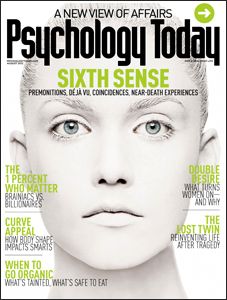Attention
Hunting for Coincidences
Everyone loves a coincidence. Few agree whether it's meaningful.
Posted July 3, 2012

Isaac Asimov asserted that advances in science do not start with "Eureka" moments. Rather, someone simply notes, "That's funny." Asimov's observation also highlights the extremes with which people respond to the phenomenon of coincidence.
Our tendency to see patterns everywhere means that sometimes we discover wonderful truths about the world. Just as often, we are drawn into subjective cul-de-sacs. In this month's cover story, "The Unbearable Uncanniness of Being," Matthew Hutson explores why people—some in particular—glorify anomalous experiences.
Our brains are pattern-seeking missiles that cannot help but notice coincidences; whether we imbue them with meaning is another matter. The tendency to learn a new word or concept only to "suddenly" encounter it everywhere strikes people as somewhere between notable and miraculous, even though it can be explained by our brain's capacity for selective attention: We home in on novel stimuli while filtering out myriad unrelated data.
There's an obscure term floating around that describes obscure terms or ideas that feel ubiquitous as soon as they are on our radar: the Baader-Meinhof phenomenon.
Funny, I thought, on first encountering the term. Is the Baader-Meinhof gang now obscure enough to headline a neologism about obscurity? (I lived in Germany as a child, so in my mind this defunct terrorist group was once on the order of Al-Qaeda). This disconnect actually captures a tricky element in coincidence: "Baader-Meinhof" is supercharged to those touched by them; mere trivia to everyone else.
We can pretty much agree on what constitutes coincidence, but not on when it's meaningful. Two families who visit Disneyland on the same day are data points. When the families contain a boy and a girl who years later meet and marry, the couple in question calls it fate. If it happens to you: "Eureka!" To anyone else: "That's funny."
Don't get me wrong, I love to read about the triumph of chance as much as the next person and publication. The New York Times recently ran a fun piece about two highly coincidental wedding announcements. There's charm in watching someone hit an existential jackpot, even if you usually don't get a cut of the purse. But there's also satisfaction in understanding how the brain is moved to seize upon such moments from the start.


